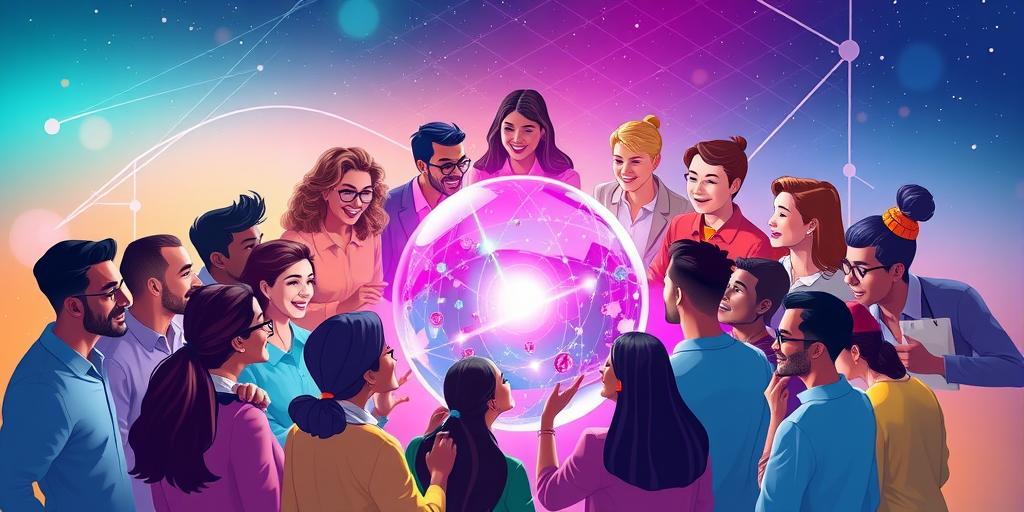Have you ever wondered how we can make the vast ocean of knowledge accessible to everyone, regardless of their background or location? The answer might surprise you: data science. It’s no longer a futuristic fantasy; it’s actively reshaping how we access, understand, and utilize information, leading to a true democratization of knowledge. In this post, we’ll explore how data science is breaking down barriers and empowering individuals with unprecedented access to learning and insight. Prepare to be amazed by the transformative potential of data science in education and beyond!
Data Science: The Great Equalizer in Education
Data science offers powerful tools for personalizing education and making it more accessible. Imagine a world where learning platforms adapt to individual student needs, providing customized content and pacing. This is becoming a reality thanks to data-driven insights. Educational data mining techniques analyze student performance data, identifying areas where they excel and where they struggle. This allows educators to provide targeted support, ensuring no student gets left behind.
Personalized Learning Paths
Through sophisticated algorithms, data science can tailor learning pathways to each student’s unique learning style and pace. Students can move at their own speed, focusing on areas requiring more attention, and accelerating through topics they grasp quickly. This personalized approach fosters better comprehension and improved learning outcomes, ultimately making education more effective and inclusive.
Breaking Down Geographical Barriers
Access to quality education is often limited by geographical location. Data science plays a crucial role in bridging this divide. Online learning platforms, powered by data analytics, can reach students in remote areas or underserved communities, providing access to high-quality educational resources that were previously unavailable. The power of data is transforming the global landscape of education, ensuring greater inclusivity and opportunity for learners worldwide. This increased accessibility to education through data science is impacting everything from literacy rates to overall economic development.
Making Knowledge More Accessible to All
The democratization of knowledge extends beyond formal education. Data science is making vast amounts of information more accessible to the general public. Consider the implications of easily accessible and analyzed datasets on topics ranging from healthcare to environmental science. By making complex data sets understandable to the public, we enable informed decision-making and empower individuals to participate more actively in society.
Open Data Initiatives and Citizen Science
Many governments and organizations are releasing open datasets, and data science techniques are crucial for making sense of this wealth of information. Citizen science projects, using data science methods, allow everyday people to contribute to research and discovery. Through data analysis, anyone can participate and help solve real-world problems, regardless of their formal training. This participatory approach leverages collective intelligence and fosters a more informed citizenry.
Data Visualization and Storytelling
Data visualization techniques, a core component of data science, transform complex datasets into easily understandable graphics and charts. This helps to communicate complex research findings and information to a wider audience, making knowledge more accessible to those who might not have a scientific or technical background. This ability to transform complex datasets into easily digestible narratives is revolutionizing the way we communicate information across multiple platforms.
The Future of Knowledge Democratization Through Data Science
The future of knowledge democratization is intricately linked to the advancement of data science. As data science tools become more sophisticated and user-friendly, even more people can utilize them to access and share information. Expect to see a surge in user-friendly data analysis tools and platforms that put the power of knowledge discovery into the hands of everyday people. This will be particularly apparent in developing countries where technology accessibility is significantly improving.
AI-Powered Learning Platforms
Artificial intelligence (AI) is transforming the learning experience by providing personalized feedback and adaptive learning pathways. AI-powered learning platforms leverage data science to analyze student performance in real-time, adapting the learning experience to individual needs and optimizing learning outcomes. This ensures that all students, regardless of their starting point, receive appropriate support and maximize their learning potential. The fusion of AI and data science is redefining the very essence of education.
Open Educational Resources (OER)
The rise of OER, which includes digital learning materials that are freely accessible, is another example of how data science is democratizing access to knowledge. Data science is being employed in organizing, tagging, and improving the discoverability of OER, ensuring that high-quality educational resources are available to learners worldwide. This not only improves access to education but also significantly reduces the cost burden associated with learning.
Unlock the power of data science and join the movement towards a more accessible and equitable world. Let’s democratize knowledge, together!




